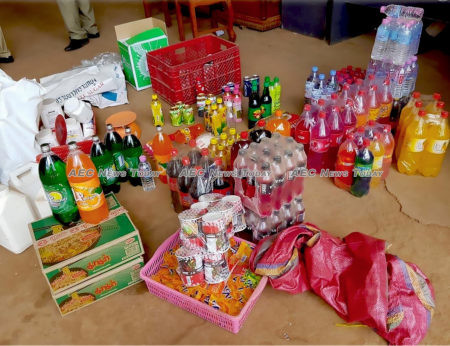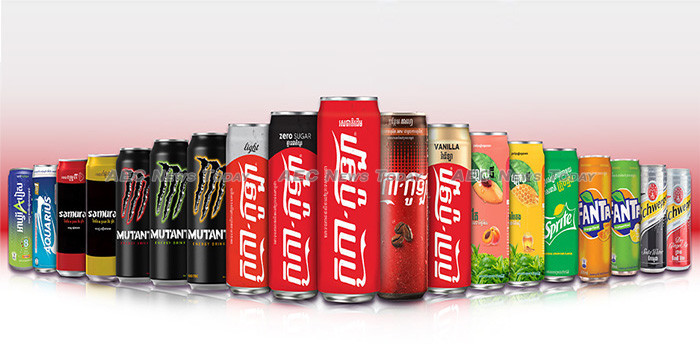The Cambodian producers of Coca-Cola products have moved quickly to reassure its customers that its products are safe to consume following media reports that some of its lines had been found being counterfeited.
According to the July 11 edition of The Phnom Penh Post (The Post) ‘Coca-Cola, Fanta, 7-Up, and energy drink Samurai’ were among brands being counterfeited at a Kampong Thom mineral water factory raided by police and officers from the Interior Ministry’s Counter Counterfeit Committee (CCC) on Wednesday (July 10). However, it is fake news.
Ros Sophea, country legal and PAC director for Cambodia Beverage Company (CBC), told AEC News Today by email that the company has been working with Cambodian authorities since the raid was reported in The Post. “According to the current updates, no counterfeit bottles and cans of Coca-Cola products were produced at this factory as reported”
Mr Sopeha said CBC “manufactures its products following strict policies, requirements and specifications provided through an integrated quality management programme that measures all of our operations against the same global standards for production and distribution of our beverages”.
Reiterating that CBCs products are safe to consume, Mr Sopheahea said “the quality of our products and safety to consumers are always our top priority”.

In the original story The Post claimed ‘a raid led by provincial court prosecutor Ith Sothea, and deputy chief of the CCC, Kan Vathana, had found the popular brands being counterfeited for ‘national distribution’.
According to the report, ‘ the fake soft drinks were produced by adding flavourings, colourings and other ingredients to tap water. They were then placed in authentic-looking counterfeit bottles to be sold as the real thing’. A blurry photograph showed pallets of shrink-wrapped bottles inside a warehouse.
However, an article on Khmer language news website Cambodia Express News (CEN) displayed clearer photos showing a number of items allegedly seized by authorities. None had the appearance of being a Coca-Cola family product, while the article described the beverages as ‘fruit juices’.
While consumers can continue to enjoy Coca-Cola, Fanta, or 7Up without fears as to the safety or quality of the product, Cambodia consumers are left wondering exactly what brands they should avoid, with no statement having been issued by authorities.
Attempts to contact the Cambodia Ministry of Health on Friday (July 12) were unsuccessful, with the telephone going unanswered.
Update #2: This story was last updated at 10:42 local time on July 15, 2019 following the publication of this story The Post deleted its original story titled Fake Coke, Fanta factory shut down after raid. The original story can be found here courtesy of wayback machine.
An earlier update was made at 10:33 local time on July 13, 2019. In an article published on the Lookgooday news website late on July 12 Lim Phaon, owner of Lim Phorn Enterprise, the Kampong Thom mineral water factory raided by Cambodia authorities refuted claims the business was not correctly registered or was counterfeiting products. In the article he presents a full range of business registration and licence documents and says he intends to sue the Ministry of Interior and the Counter Counterfeit Committee (CCC) for defamation and damage to his brand.
AEC News Today is attempting to seek additional comment from Mr Lim and Cambodia Beverage Company.
Feature photo Cambodia Beverage Company Ltd.
Related:
- Fake beer destroyed (Khmer Times)
- Government destroys over 80 tonnes of fake products (The Phnom Penh Post)
- Sar Kheng orders crackdown on counterfeit goods traffickers (The Phnom Penh Post)
- Economic police seize hundreds of counterfeit bags (Khmer Times)
John Le Fevre
He has spent extensive periods of time working in Africa and throughout Southeast Asia, with stints in the Middle East, the USA, and England.
He has covered major world events including Operation Desert Shield/ Storm, the 1991 pillage in Zaire, the 1994 Rwanda genocide, the 1999 East Timor independence unrest, the 2004 Asian tsunami, and the 2009, 2010, and 2014 Bangkok political protests.
In 1995 he was a Walkley Award finalist, the highest awards in Australian journalism, for his coverage of the 1995 Zaire (now Democratic Republic of Congo) Ebola outbreak.
Prior to AEC News Today he was the deputy editor and Thailand and Greater Mekong Sub-region editor for The Establishment Post, predecessor of Asean Today.
In the mid-80s and early 90s he owned JLF Promotions, the largest above and below the line marketing and PR firm servicing the high-technology industry in Australia. It was sold in 1995.
Latest posts by John Le Fevre (see all)
- COVID-19 in Asean: update for July 26 — 16 mln case barrier breached, Vietnam records community transmission – July 26, 2020
- COVID-19 in Asean: update for July 25 — new high for daily infections, 16 mln infection barrier to break today – July 25, 2020
- COVID-19 in Asean: update for July 24 — Asean tops 230,000 cases, nudges 90,000 active – July 24, 2020
- Thailand morning news for July 24 – July 24, 2020


